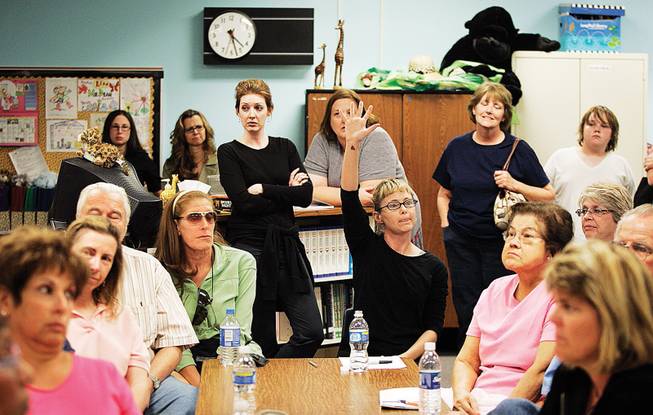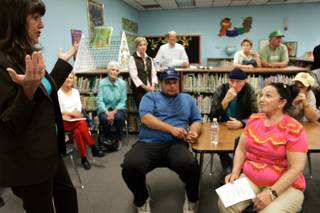
Neighbors of Elaine Wynn Elementary School attend a community meeting Monday about a planned health care clinic on the school’s campus. School Board Vice President Carolyn Edwards apologized to the group for not being more communicative.
Tuesday, Nov. 3, 2009 | 2 a.m.
Reader poll
Map of Elaine Wynn Elementary School
Sun Archives
- Schools have valued partner in Elaine Wynn’s group (10-22-2009)
- Task at hand: Flu-readiness (9-20-2009)
- Newest health center fills a need (9-12-2009)
- School-based clinics offer care of kids in health system's gaps (7-18-2008)
- Volunteers works to make life better for poor students (1-10-2007)
Sun Coverage
Beyond the Sun
This is a reality that not everyone is comfortable with: The burden of identifying — and treating — students with health issues has increasingly fallen to local public schools, some of which share their campuses with independently operated health clinics.
Over the years the health clinics at six Clark County campuses have done more than just connect needy students with basic care such as eye and dental exams or vaccinations. Clinic staff have spotted potentially life-threatening illnesses and diseases that might otherwise have gone undiagnosed and untreated.
The health clinic locations are chosen not just to serve the students at those campuses, but also for proximity to other schools with high-need populations. Students from 40 Henderson campuses, for instance, have access to health services at the clinic operating at Basic High School.
Some people don’t welcome school-based health clinics. Consider the gathering Monday of about 50 residents of the Spring Valley neighborhood to complain about plans to develop a health clinic at Elaine Wynn Elementary, east of Jones Boulevard.
Some of their opposition apparently stems from misunderstandings about how the clinics are funded, and who has access to the services.
Some people say they are angry that tax dollars would be going to provide health care — a service seen as outside the School District’s primary mission. Others expressed fear that the neighborhood would be flooded with uninsured adults and children using the clinic as a primary health care provider.
Here are the facts: Virtually no public money is spent either to build or to operate the clinics. The School District provides the land and the utility hookups and pays only for a staff coordinator in the School Community Partnership Office to work with the clinics, which serve youths up to age 18.
Others residents worry about the impact of increased traffic in their area. But the principals of several of the existing clinics said there is no discernible increase during the clinic hours.
Adding fuel to the fire for some of the residents living near Wynn Elementary might have been the timing of the Oct. 22 groundbreaking, which struck some observers as premature when final approval from the county is pending. The School Board is expected to discuss the proposed memorandum of understanding between the district and the nonprofit organization that will run the clinic, Communities in Schools, at a work session Wednesday.
School Board Vice President Carolyn Edwards apologized at Monday’s gathering, which the School District held to try to head off protests when the clinic goes to the Clark County Commission for approval. “We want to be good neighbors with you,” Edwards told the group. “We should have communicated with you earlier on.”
The critics included home-owner Colette Welsing, who said that even though the neighborhood includes large custom homes, with the presence of the clinic, “the first impression will be that this is an impoverished area.”
The process of approving the clinic without community input, she said, was “extremely offensive.”
Wynn Principal Ellen Bordinhao said many of the clinic’s patients will be her students, 85 percent of whom qualify for free or reduced-price meals. “Our families need it, plain and simple,” she told the school’s neighbors.
Health clinics at Roy Martin Middle School, Valley High School and C.P. Squires Elementary are operated by the private, nonprofit Nevada Health Centers. The campus health center at Basic High operates through a partnership with Nevada State College, which provides funding and staff.
Communities in Schools, which would operate the clinic at Wynn Elementary, already operates clinics at Cunningham and Martinez elementary schools. The Southern Nevada chapter of NAIOP, the commercial real estate development association, has offered to donate the clinic building at Wynn Elementary, which would be named in memory of Casey Jones, who served as the business group’s president in 2005.
In the 2008-09 academic year the two Communities in Schools campus health centers provided 3,250 pediatric exams, which included immunizations, treatment of illnesses and the physicals required to participate in district athletics.
To state Sen. Joyce Woodhouse, D-Henderson, who served as director of the district’s School Community Partnership Office from 1989 until her retirement in 2006, the campus-based health clinics are an example of successful collaboration. Being able to treat students at a neighborhood school means less instructional time is lost, Woodhouse said.
“Students are not going to be able to learn or achieve if they’re not in school or not getting the basic health care they need,” said Woodhouse, who is chairwoman of the Legislative Committee on Education. “I would hope the clinic provider, the district and the (Wynn Elementary) neighborhood can work together to address everyone’s concerns.”


Join the Discussion:
Check this out for a full explanation of our conversion to the LiveFyre commenting system and instructions on how to sign up for an account.
Full comments policy